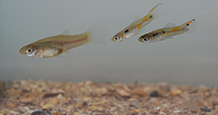Psychology news archive 2015

Study to tackle transient loneliness
Exeter researchers hope a new study will raise awareness of ‘transient loneliness’.

Fellow appointments recognise Social Science excellence
Two leading academics from diverse fields at the University of Exeter have been appointed as Fellows of the Academy of Social Sciences.

Can food affect your mood? Researchers call for participants to take part in MoodFood trial
Researchers from the University of Exeter are seeking participants for a trial into whether certain types of food could prevent depression.

Female guppies become better swimmers to escape male sexual harassment
In the animal world, sexual reproduction can involve males attempting to entice or force females to mate with them, even if they are not initially interested.

Free online therapy for depression offered as part of exciting new research trial
Researchers from the University of Exeter have launched a large-scale research study to improve understanding of treatments that are currently offered to people with depression.

Sleep makes our memories more accessible, study shows
Sleeping not only protects memories from being forgotten, it also makes them easier to access, according to new research from the University of Exeter and the Basque Centre for Cognition, Brain and Language.

Large-scale trial will assess effectiveness of teaching mindfulness in UK schools
A major Wellcome Trust study to assess whether mindfulness training for teenagers can improve their mental health launches today.

Study shows grey squirrels are quick learners
A new study from the University of Exeter has shown that grey squirrels are quick learners capable of adapting tactics to improve efficiency and reap the best rewards.

Online computer game can help shed weight and reduce food intake
A simple new computerised game could help people control their snacking impulses and lose weight.

Work-life balance subject of TedxExeter talk
Professor Michelle Ryan will be taking to the stage at the hugely popular TedxExeter this Friday (24 April) to talk about work-life balance and issues of time and identity.

Online discussion forums good for well-being, study shows
A new study has found that internet discussion forums have positive links to well-being and are even associated with increased community engagement offline.

Mindfulness-based therapy could offer an alternative to antidepressants for preventing depression relapse
Mindfulness-based cognitive therapy (MBCT) could provide an alternative non-drug treatment for people who do not wish to continue long-term antidepressant treatment.

Global Conversation: Exeter’s New Global Lecture Series
The University of Exeter has launched Global Conversation; a new international lecture series, showcasing some of the latest developments in world-leading research.

A difficult climate: New study examines the media’s response to the IPCC
A study, published today in the journal Nature Climate Change, has for the first time analysed how Twitter, TV and newspapers reported the IPCC’s climate evidence.

World-leading dementia research team joins the University of Exeter
A global figure in the field of dementia study has joined the University of Exeter to lead a new Centre for Research in Ageing and Cognitive Health (REACH).

Paul hopes to solve the mysteries of flamingo fatherhood
A researcher at the University of Exeter has launched a bid to analyse the DNA of a group of flamingos in order to answer some of the questions surrounding paternity and social behaviour in the distinctive pink birds.

Old mothers know best: killer whale study sheds light on the evolution of menopause
A new study led by the Universities of Exeter and York has shown that female killer whales survive after menopause because they help their family members find food during hard times.

Tackling concussion with Exeter Chiefs
Specialists from the University of Exeter are working with Exeter Chiefs Rugby Club on a project to model what happens to the brain of a player when they are concussed in order to improve safety and manage the impact of injuries following head trauma.

Plain packaging reduces ‘cigarette-seeking’ response by almost a tenth, says study
Plain tobacco packaging may reduce the likelihood of smokers seeking to obtain cigarettes by almost 10% compared to branded packs, according to research from the Universities of Exeter and Bristol.

James tells his story of surviving a traumatic brain injury
A man who suffered a traumatic brain injury (TBI) will describe his incredible experience and the challenges faced by himself and others at a special event at the University of Exeter on February 4.

University of Exeter Psychology postgraduate wins writing competition
University of Exeter postgraduate Natasha Boyland has been awarded first prize in a writing competition run by the British Society of Animal Science (BSAS).
